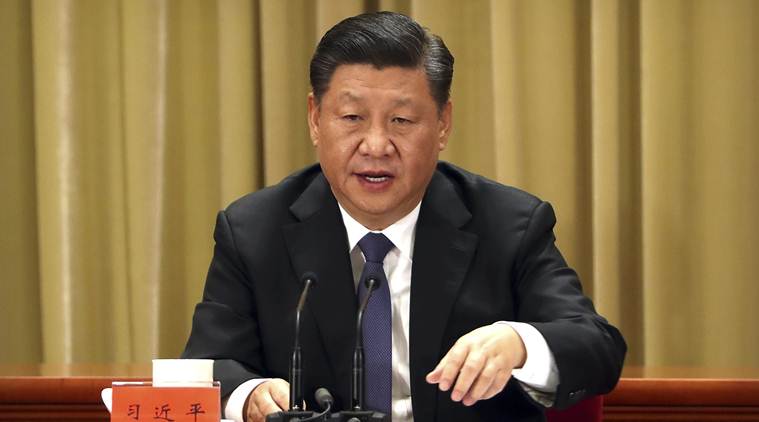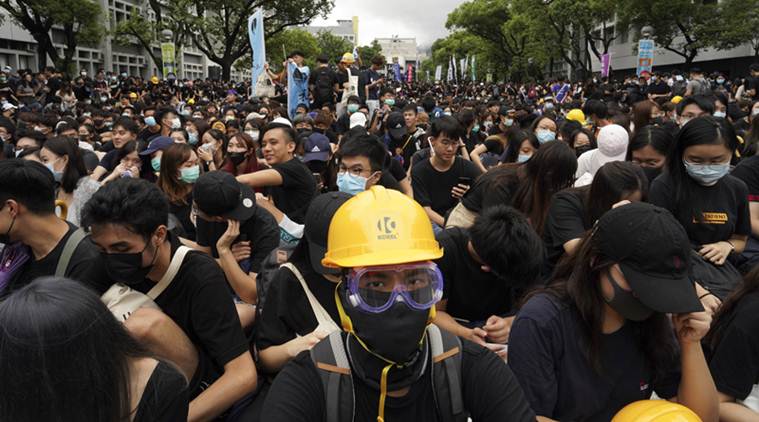
Written by Steven Lee Myers, Chris Buckley and Keith Bradsher
China’s leader, Xi Jinping, warned a gathering of senior Communist Party officials in January that the country faced a raft of urgent economic and political risks, and told them to be on guard especially for “indolence, incompetence and becoming divorced from the public.”
Now, after months of political tumult in Hong Kong, the warning seems prescient. Only it is Xi himself and his government facing criticism that they are mishandling China’s biggest political crisis in years, one that he did not mention in his catalog of looming risks at the start of the year.
And although few in Beijing would dare blame Xi openly for the government’s handling of the turmoil, there is quiet grumbling that his imperious style and authoritarian concentration of power contributed to the government’s misreading of the scope of discontent in Hong Kong, which is only growing.
On Friday and Saturday the protests and clashes with police continued in Hong Kong, even after the region’s embattled chief executive, Carrie Lam, made a major concession days earlier by withdrawing a bill that would have allowed the extradition of criminal suspects to the mainland, legislation that first incited the protests three months ago.
The Communist Party’s leadership — and very likely Xi himself — has been surprised by or oblivious to the depth of the animosity, which has driven hundreds of thousands into the streets of Hong Kong for the past three months. While it was the extradition bill that set off the protests, they are now sustained by broader grievances against the Chinese government and its efforts to impose greater control over the semi-autonomous territory.
Beijing has been slow to adapt to events, allowing Lam to suspend the bill in June, for example, but refusing at the time to let her withdraw it completely. It was a partial concession that reflected the party’s hard-line instincts under Xi and fueled even larger protests.
As public anger in Hong Kong has climbed, the Chinese government’s response has grown bombastic and now seems at times erratic. In July, at a meeting that has not been publicly disclosed, Xi met with other senior officials to discuss the protests. The range of options discussed is unclear, but the leaders agreed that the central government should not intervene forcefully, at least for now, several people familiar with the issue said in interviews in Hong Kong and Beijing.
At that meeting, officials concluded that Hong Kong authorities and local police could eventually restore order on their own, officials said, speaking on condition of anonymity to discuss internal deliberations.
There are hints of divisions in the Chinese leadership and stirrings of discontent about Xi’s policies.

Jean-Pierre Cabestan, a political science professor at Hong Kong Baptist University and an expert on Chinese politics, said it appeared that there was debate during the annual informal leaders’ retreat in Beidaihe, a seaside resort not far from Beijing.
Some party leaders called for concessions, while others urged action to bring Hong Kong more directly under the mainland’s control, he said. Cabestan said he believed that “the Chinese leadership is divided on Hong Kong and how to solve the crisis.”
Wu Qiang, a political analyst in Beijing, said Xi’s government had in effect adopted a strategy to procrastinate in the absence of any better ideas for resolving the crisis. “It is not willing to intervene directly or to propose a solution,” he said. “The idea is to wait things out until there is a change.”
The upshot is that instead of defusing or containing the crisis, Xi’s government has helped to widen the political chasm between the central government and many of the 7 million residents in a city that is an important hub of international trade and finance, critics said.
Another sign of the disarray within the government was the reaction to Lam’s withdrawal of the bill. On Tuesday, officials in Beijing declared there could be no concessions to protesters’ demands. A day later, when Lam pulled the bill back, she claimed to have Beijing’s blessing to do so. The same officials were silent.
On Friday, China’s premier, Li Keqiang, said during a news conference with Chancellor Angela Merkel of Germany, who was visiting China, that the government supported Hong Kong in “halting the violence and disorder in accordance with the law.”
Xi, who is 66 and in his seventh year of his now unlimited tenure as the country’s paramount leader, has cast himself as an essential commander for a challenging time. He has been lionized in the state news media as no other Chinese leader has been since Mao.
This has made political solutions to the Hong Kong situation harder to find, because even senior officials are reluctant to make the case for compromise or concessions for fear of contradicting or angering Xi, according to numerous officials and analysts in Hong Kong and Beijing.
“Beijing has overreached, overestimating its capacity to control events and underestimating the complexity of Hong Kong,” said Brian Fong Chi-hang, an associate professor at the Academy of Hong Kong Studies at the Education University of Hong Kong.
The tumult in Hong Kong could pose a risk to Xi, especially if it exacerbates discontent and discord within Chinese leadership over other issues. “I think the danger is not that his standing will collapse, but that there is a whole series of slowly unfolding trends that will gradually corrode his position,” said Richard McGregor, a senior fellow at the Lowy Institute in Sydney and author of “Xi Jinping: The Backlash.”
Some analysts see a parallel between Xi’s handling of Hong Kong and the trade war with the United States, which, like the economy more broadly, seems to be the greatest worry for his government at the moment.
In Hong Kong, Xi’s government unwaveringly supported the extradition bill. And it stuck by that position, refusing to allow Lam to withdraw it formally, even as protesters’ demands grew broader. Her pledge to withdraw it now has been dismissed as too little, too late.
In the trade talks, China also balked at accepting President Donald Trump’s initial demands for concessions. When the two sides came close to an agreement in the spring, outlined in a 150-page document, Xi appeared to balk, scuttling the process.
Now Xi faces an even bigger trade war, with much higher tariffs and greater tensions. The government appears to be hewing to a strategy of waiting out Trump, possibly through his 2020 reelection campaign, even as the dispute has become a drag on the economy. It remains unclear how Xi’s government conveyed its approval for Lam’s decision — or whether it did. Lam’s sudden shift evolved in a matter of days after last weekend’s clashes between protesters and police, several officials said.
Lam said the decision to withdraw the extradition bill was hers, but she also asserted that she had Beijing’s full support for doing so, suggesting more coordination than either side has publicly acknowledged.
The silence from officials and in the state news media about Lam’s concession suggested that if Xi’s government did approve of the sudden shift, it wanted to stifle public discussion of it in the mainland.
Hong Kong’s unique status, with its own laws and freedoms, has long created a political dilemma for China’s leaders, especially for Xi, who has made China’s rising economic and political might a central pillar of his public appeals.
China’s recovery of sovereignty over the former British colony is a matter of national pride that reversed a century and a half of colonial humiliation. But the mainland maintains what amounts to an international border with Hong Kong.
The government’s deepest fear now appears to be that the demands for greater political accountability and even universal suffrage heard on the streets in Hong Kong could spread like a contagion through the mainland. So far, there have been few signs of that.
Xi continues to barely mention Hong Kong. He has said nothing about the protests, even in his passing reference Tuesday. He has not visited since 2017, when he marked the 20th anniversary of the handover from Britain.
Xi’s calculation might be simply to remain patient, as he has been in the case of Trump’s erratic shifts in the trade war. In his remarks Tuesday, Xi also gave a possible hint of the government’s pragmatism.
“On matters of principle, not an inch will be yielded,” he said, “but on matters of tactics there can be flexibility.”